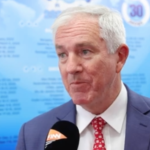The aerospace industry has a diversity problem that needs to be addressed by companies as they recruit new members of staff, said Tom Kelly, co-founder of Evona.
The Bristol-based space sector specialist aims to actively tackle inclusivity and skill shortages by focusing on recruiting a diverse pool of talent.
Evona, which has expanded to the United States, has sought to challenge the status quo and show that space is for everyone, regardless of background.
Tipping point
Speaking at the Farnborough International Airshow in July, he said: “Compare it to most of the sectors in the US and it’s pretty much the worst. And what we’ve identified is that between the ages of 10 and 13 for girls, STEM becomes a boy thing. That’s kind of the tipping point.
“What you’ve got is white men pushing their white sons into STEM so it’s just a problem that is just getting worse and worse and worse and worse. That’s where the problem starts.
“Furthermore, when it does come to staffing and recruiting, most companies just advertise their jobs. But the issue with that is that women are six times less likely to apply to an advert, and I’m not saying it’s the same for all women, but most women when they look at an advert will try to find reasons why they’re probably not the right fit for the job.
“Whereas guys on average will go I’ll just give it a go, basically. So all these companies that are advertising their jobs, it is this ever white, ever male STEM sector that’s then six times more likely to attract guys. So this is why there’s a diversity issue.”
Making a change
He added: “We’ve attracted people in different backgrounds, and attracted lots of women. Things that can be done for example, when you’re trying to attract people into your company, just send them a message, you need to explain the company. Don’t put a list of skills, explain what you can offer, and that for us has meant that we’ve attracted lots and lots of people from different backgrounds.
“Something that organisations can do is provide more flexibility, so 69 per cent of women last year that left their job would have stayed in their job if they would have had more flexibility. Companies need to be thinking, how can I be flexible? How can I offer more chance to work from home, more chance to pick up the kids.”
Subscribe to the FINN weekly newsletter

